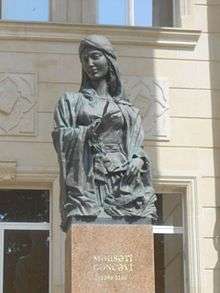Mahsati
Mahsati Ganjavi (Persian: مهستی گنجوی), (born c. 1089 in Ganja - died after 1159) was a 12th-century Persian[1][2][3] poet. Mahsati (مهستی) is a compound of two Persian words "Mah/Maah" (Moon) and "Sati" (Lady). [4] The word appears in the works of Sanai,[4] Nizami,[4] Attar,[5] Rumi,[6] and Saadi,.[4] As an eminent poet, she was composer of quatrains (ruba'is).

Biography
Originated from Ganja, she was said to have associated with both Omar Khayyam and Nizami. She is also said to have been a companion of Sultan Sanjar. Her alleged free way of living and peddled verses have stamped her as a Persian Madame Sans-Gêne [7][8]. Her purported love affairs are recounted in the works of Jauhari of Bukhara.
No details about her life are documented except that she was born in Ganja and was highly esteemed at the court of Sultan Sanjar of the Seljuk dynasty. She is said to have attracted the notice and gained the favor of Sanjar by the following verse, which she extemporized one evening when the King, on going out from his audience-hall to mount his horse, found that a sudden fall of snow had covered the ground:
شاها فلکت اسب سعادت زین کرد |
For thee hath Heaven saddled Fortune’s steed, |
| —Translation by Edward G. Browne |
It is also known that Mahsati was persecuted for her courageous poetry condemning religious obscurantism, fanaticism, and dogmas. Her only works that have come down to us are philosophical and love quatrains (rubaiyat), glorifying the joy of living and the fullness of love. The most complete collection of her quatrains are founded in the Nozhat al-Majales. Approximately 60 quatrains of her are found in the Nozhat al-Majales.[9] A monument to her was placed in Ganja in 1980.
Example of original work in Persian
ما را به دم تير نگه نتوان داشت |
We can't be halted by tip of the arrow |

References
- Encyclopædia Britannica Persian literature
- Bruijn, J.T.P. de. "Mahsatī." Encyclopaedia of Islam, Second Edition. Edited by: P. Bearman , Th. Bianquis , C.E. Bosworth , E. van Donzel and W.P. Heinrichs. Brill, 2009. excerpt: "a Persian female poet whose historical personality is difficult to ascertain. "
- Edward Brown, A literary History of Persia in Four Volumes. Cambridge university Press 1969.
- Dehkhoda dictionary, "Mahsati" From Dehkhoda Dictionary: مهستی [ م َ س ِ / م َ هَِ ] (اِ مرکب ) مخفف ماه ستی (ستی مخفف عربی سَیِّدَتی ). ماه خانم . ماه بانو. || از نامهای ایرانی : داشت زالی به روستای تکاو / مهستی نام دختری و سه گاو. سنائی . ستی و مهستی را بر غزلها / شبی صد گنج بخشی در مثلها. نظامی . دختر اندر شکم پسر نشود / مهستی را که دل پسر خواهد. سعدی
- See Elahinameh of Attar
- نی کدخدای ماهی نی شوهر مهستی
- PROPOSALS FOR THE CELEBRATIONS OF ANNIVERSARIES WITH WHICH UNESCO COULD BE ASSOCIATED IN 2012-2013, AND APPEALS BY MEMBER STATES CONCERNING THEIR PROPOSALS
- Seyid Yəhya Bakuviyə həsr edilmiş tədbir keçirib
- Encyclopedia Iranica, "NOZHAT AL-MAJĀLES", Mohammad-Amin Riahi Archived 2010-03-10 at the Wayback Machine
Bibliography
- Jan Rypka, History of Iranian Literature. Reidel Publishing Company. 1968 OCLC 460598. ISBN 90-277-0143-1
- Edward Brown, A Literary History of Persia. 4 vol. Cambridge university Press 1969, vol. 2, p. 344)
- R. M. Chopra, Eminent Poetesses of Persia, Iran Society, Kolkata, 2010.